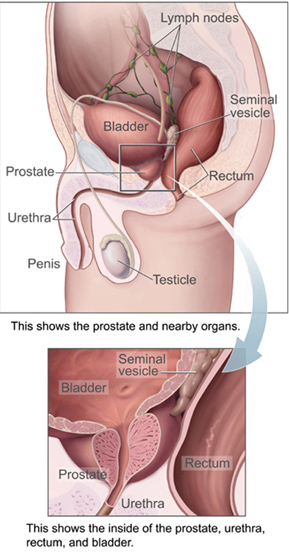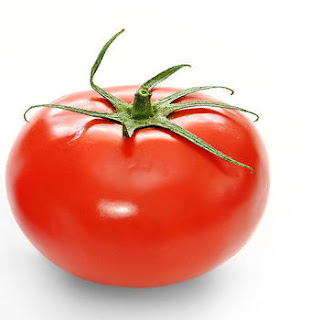About the Prostate
The prostate is a pear-shaped gland located in front of the rectum and surrounds the bottom of the bladder or urine storage.
The main function of the prostate is to produce fluid which protects and deliver sperm when a man ejaculates. The more a man gets older, it also increases the risk of prostate cancer. That's because the prostate often enlarges gradually after the age of 50 years. At that time, the hormone testosterone in the testis is converted by the enzyme 5-a reductase to dihydrotestosterone (DHT).
What is prostate cancer?
Prostate cancer is cancer that develops when prostate cells mutate and begin to grow out of control. These cells may spread from the prostate metastasis to other body parts, especially the bones and lymph nodes. Prostate cancer may cause pain, difficulty urinating, erectile dysfunction and other symptoms.
 |
http://en.wikipedia.org/wiki/Prostate |
Prostate cancer is one of the deadliest men's cancer in the world. There are about 400,000 new cases are found each year. Men over age 50 have prostate cancer risk. In general, prostate cancer occurs in men, especially those aged over 65 years.
Prostate cancer needs to watch out because it develops slowly and had no symptoms until it has reached an advanced stage.
Causes of Prostate Cancer
The cause of prostate cancer is not known with certainty, but there are some things that can increase a person's risk for prostate cancer, including age and family history. Hormonal factors, diet high in fat, and toxins are also cited as a risk factor for prostate cancer although the relation is not clear.
Symptoms of Prostate Cancer
Recognizing the symptoms of prostate cancer can increase the chances of curing the deadly disease, especially for the elderly. If it's too late to do the treatment of prostate cancer, making it difficult to cure.
If it has been handled since the early stages, the life expectancy can reach 90%. When it reaches advanced stages, in many cases, life expectancy is only 50 percent. In 5 years, the patient will die.
Here are some symptoms that may occur in prostate cancer:
1. The desire to urinate more often, especially at night.
2. Difficulty when urinating.
3. Difficulty holding urine.
4. Weakness or disturbance in the flow of urine.
5. Feel pain or burning during urination.
6. Difficulty in having an erection.
7. Pain during ejaculation.
8. There was blood in urine or semen.
9. Frequent pain or stiffness in lower back, hips, or upper thighs.
10. Blood appears in the urine or semen.
11. erectile dysfunction
You should immediately consult a doctor if you have one or more of the above symptoms.
Although probably not due to prostate cancer, but these symptoms can also indicate the presence of disease or other disorders of the prostate, such as BPH or prostatitis.
Prostate Cancer Treatment
Prostate cancer can generally be classified according to malignancy and the stage. Degree of malignancy describes a number of tumor cells has undermined the normal cells of prostate cancer.
Before treatment, it is better to know the stage, then make sure no cancer cells spread to bone. Therefore, it requires a bone scan or MRI, if necessary. Prostate cancer treatment options include observation if it is still small, surgical removal of the testicles, light therapy, hormonal therapy, chemotherapy and palliative care.
Chemotherapy treatment is mainly carried out on prostate cancer patients who have advanced stage, which spread to the spinal cord. In this condition, patients usually experience tremendous pain in the spine and hip. Chemotherapy treatment serves to reduce the pain, so at least improve the quality of life of sufferers.
Prostate Cancer Prevention
Here are a few tips that can reduce the risk of prostate cancer:
1. Keep your weight remains ideal. If you suffer from obesity then see a nutritionist to set up a balanced diet. Combine well with sports activities.
2. Drink plenty of water. Water is essential to health because it helps reduce the toxins - toxins from the body. The ideal water consumption per day is 6-8 glasses a day. Coffee and tea are not included in the consumption of water.
3. Avoid drinking alcohol.
4. Eating foods that contain lots of lycopene such as tomatoes and bits.
5. Eating foods that contain omega-3 fatty acids such as soybeans and soybean products such as milk, salmon, tuna and sardines.
6. Eating foods that contain beta-carotene such as carrots.
7. Reduce consumption of meat and fat.
8. Make sure you have adequate intake of selenium and vitamin E.
9. Reduce stress and depression. Look for activity or exercise to help soothe the mind.
source:
